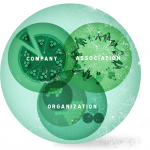As we look around at society, the world seems to be full of rules. These unwritten rules seem to dictate every aspect of how we live our lives: They govern how we dress, what we say, and how we earn money. There is, however, one element that they cannot change, and that is who we really are when societal convention is taken away. We can follow a prescribed way of being, but we all have aspects of our personality that need to be expressed. This is authenticity.
Traditionally, the world of work was the epitome of conformity. There has always been an expected way of dressing, for example, that often involved different dress codes for men and women. Men were often expected to wear suit trousers and jacket, a dress shirt, and a tie, while women wore a more feminine equivalent. Expectations, from how people presented themselves to the type of work they chose, was heavily determined by gender.
We have made huge strides in recent years. Many companies hire diversity and inclusion specialists to ensure that people from minority groups are being fairly represented, and there are less assumptions made in terms of gender specific dress codes. What we must keep challenging now are the unwritten rules that remain. We are so used to unwritten rules in our society that we are often barely aware they exist. Every preconception we have regarding what constitutes male or female, masculine or feminine, what can and can’t be considered workwear, are all examples of assumptions we make, boxes in which we often unconsciously feel we must fit. But these boxes leave little room for individuals.
We are starting to see the evolution of the working environment. Some companies have begun revolutionizing the workplace, creating a dynamic environment where people can dress freely, in any style, and where employees are free to be themselves and are judged purely on performance and work ethic. This is by no means a widespread practice, but there are unique benefits to this approach. It allows space for the individual, for self-expression and genuineness. It allows for authenticity. The expectation and pressure of fitting a stereotype or complying with what could be perceived as expected gender norms are immediately lowered as the categories themselves are removed completely. This way of working may not be appropriate in every situation, but it does lead us to question the leeway that we can strive toward and encourage, and the benefits this could bring.
Authenticity is about how honest we feel we are being in the way we live our lives. It’s about being in the right job, working in the right way which may or may not involve full-time employment, and it’s about how we present ourselves. When we both are allowed and allow ourselves to be the most honest versions of who we are, we are creating an accepting environment in which people want to work. We are living in a time where people are beginning to question the nine-to-five narrative. With modern technology, we have more opportunities than we have ever had previously to set up our own businesses, dictate our own schedules, and make our own choices. With options like internet businesses, working from home and freelancing, we are seeing a desire for more freedom and flexibility.
This is the direction we are moving. Employers now have an opportunity to reinvent the meaning of the workplace, to create an environment where individuals can thrive, free of the gender norms and unwritten rules which were created for a generation living in another era.





